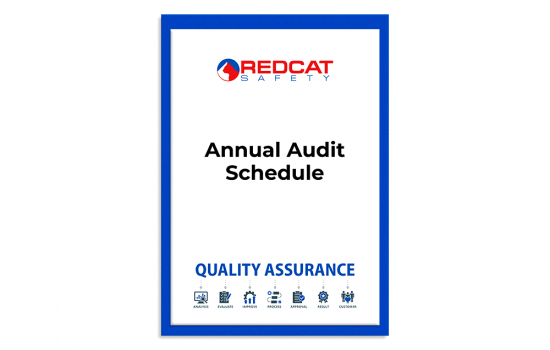What is an Audit?
An audit can be described as a systematic, independent and documented process for obtaining evidence of conformity to a set of standards and the evaluation to determine the extent of compliance. Audit evidence can be documentation, statements and records verifying the evidence, this may also include physical items and visually observed evidence. An auditor or audit team seeks to assure senior management that risks to the organization’s objectives are being (or will be) adequately managed and controlled. The audit committee findings can enable any required corrective actions and risk assessments to an ISO management system or processes to be undertaken and communicated to the relevant parties. A completed audit report should detail all of the audit results, documentation sighted and issues observed. This will enable the monitoring and reviewing of any corrective actions that were raised to be followed up and closed out.
What is an Annual Audit Schedule?
An annual audit schedule is a timetable of the audits that an organization plans to conduct over a year. The schedule includes the dates on which the audits will be conducted and may also include the names of the auditor(s) who will be conducting the audits. An annual audit schedule is an important tool because it helps auditors plan their workload and to ensure that they are conducting the right audits on the right schedule. The schedule should be reviewed and updated regularly to ensure that all planned audits are completed in a timely and efficient manner.
How Does Audit Add Value to an Organization?
By objectively auditing your organization’s management system, policies, processes and procedures you can determine if the business is performing to the expected standard and continually improve your business. An audit can help you determine:
- Health, safety, quality and environmental compliance levels.
- Operational audit process effectiveness.
- Business risks and opportunities.
- Business process compliance and controls.
- Internal control, annual risks, risk based management.
- Process and operational efficiencies.
- Cost and waste reduction opportunities.
- Corporate governance compliance.
Contents of this Annual Audit Schedule
This annual audit schedule includes the following audit schedule prompts:
- Organizational process.
- Planned audit.
- Postponed audit.
- Dates.
Why Choose to Buy this Annual Audit Schedule
This 1-page annual audit schedule can help determine the audits you wish to do. By completing the schedule you will have a timetable of your annual audit plans.
After purchasing this template you will be able to:
- Very easily edit and customize the template to create your own annual audit schedule.
- Apply your own style, format and brand to the annual audit schedule.
- Use it in any industry or sector regardless of size or type of organization.
Availability and Use of this Annual Audit Schedule
- This annual audit schedule template is accessible to you right now by clicking the ‘Buy Now’ button.
- The template will be delivered to you in fully editable Microsoft Word format for immediate and full use in your business.
- There are no subscriptions, contracts or ongoing costs.


